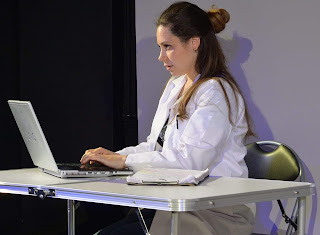If I hadn't known some of Ian Dixon Potter's previous works, I'd be tempted to be more critical towards his most recent play The Test.
His strong interest for the extreme boundaries of science has already featured in Tiresia, in which he mentions the processes used by the human body to store knowledge and memory. Another common factor in his plays is the introduction of big ethical questions, which in Boy Stroke Girl focuses on the relative role of gender identification and in Tiresia on the implications of a brain transplant. The Test, instead, elaborates on the controversial influence of Artificial Intelligence on human dynamics.
In this short but language-heavy performance, the main character is Dora (Natasha Killam), an ambitious female scientist, author of the first AI system provided with an autonomous consciousness. Contravening the instructions of her direct superior (Zara Banks), Dora decides to submit her device, called Mother, to the Turing test, which aims to establish its ability to respond to stimuli following the same behavioural pattern of a human. To do so, she needs free access to the whole internet and, for this purpose, she hires Josh (Duncan Mason), a computer hacker fresh out from prison.
It is at this point that my strongest disagreement with the script emerges, when Josh describes his fellow convicts like 'five hundred bullies, half high and half violent'. As it happens, I'm directly involved with offenders as a volunteer and I wouldn't want any of them to come across such a comment, considering the hard work many bodies do to improve their self-esteem and prevent them from offending again. The statement is addressed to one of the most vulnerable categories in society and, as such, I find it unfair and unnecessary.
The story becomes darker when, once connected to the internet, Mother is able to use its own consciousness to make calls of judgement and, eventually, becomes entirely independent from Dora. Perhaps, Dixon Potter intended to use the machine as a dystopic metaphor for the future of our civilisation, but the intensive use of specialised language is distracting and, before the 60 minutes are over, I can see some audience members flagging.
On the other hand, the play's technical elements are quite unsophisticated and
unable to attract those audiences who would better appreciate its jargon. The interface used for Mother, for example, is a colourful vortex projected on a white screen and its distorted voice of a much lower quality than many computer-generated ones.
Some compelling subjects, like industrialisation, refugee crisis, capitalism, religious conflicts and the importance of a free will, are thrown into the mix, but not expanded enough to become relevant for the unfolding of the plot. Everything is mentioned once and never explored further.
Stuck somewhere in between a sci-fi thriller and a moral drama, I'd like to think of The Test as a work in progress, founded on a good concept and following an ethical agenda, but still lacking an effective way to convey its message.
Review by Marianna Meloni
Rating: ★★★



